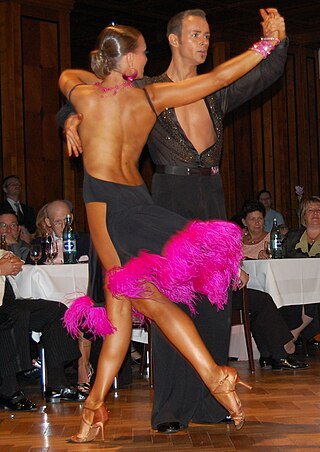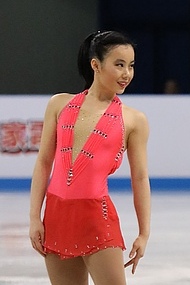
Ballroom dance is a set of European partner dances, which are enjoyed both socially and competitively around the world, mostly because of its performance and entertainment aspects. Ballroom dancing is also widely enjoyed on stage, film, and television.

Swing dance is a group of social dances that developed with the swing style of jazz music in the 1920s–1940s, with the origins of each dance predating the popular "swing era". Hundreds of styles of swing dancing were developed; those that have survived beyond that era include Charleston, Balboa, Lindy Hop, and Collegiate Shag. Today, the best-known of these dances is the Lindy Hop, which originated in Harlem in the early 1930s. While the majority of swing dances began in African-American communities as vernacular African-American dances, some influenced swing-era dances, like Balboa, developed outside of these communities.
Modern Jive is a dance style derived from swing, Lindy Hop, rock and roll, salsa and various other dance styles, the main difference being the simplification of footwork by removing syncopation such as chasse. The term "French Jive" is occasionally used instead, reflecting the origins of the style, as is the term "Smooth Jive". The word "modern" distinguishes it from ballroom Jive.

Partner dances are dances whose basic choreography involves coordinated dancing of two partners, as opposed to individuals dancing alone or individually in a non-coordinated manner, and as opposed to groups of people dancing simultaneously in a coordinated manner.

Frank Manning was an American dancer, instructor, and choreographer. Manning is considered one of the founders of Lindy Hop, an energetic form of the jazz dance style known as swing.

An exhibition game is a sporting event whose prize money and impact on the player's or the team's rankings is either zero or otherwise greatly reduced. Exhibition games often serve as "warm-up matches", particularly in many team sports where these games help coaches and managers select and condition players, before the competitive matches of a league season or tournament. If the players usually play in different teams in other leagues, exhibition games offer an opportunity for the players to learn to work with each other. The games can be held between separate teams or between parts of the same team.

The Hot Shots is a collective name for two closely related Swedish dance companies based in Stockholm, Sweden: The Rhythm Hot Shots and the Harlem Hot Shots. The Hot Shots specialize in faithful reproductions of African-American dance scenes in American films from the 1920s, 30s, and 40s. Dances that they perform include Lindy Hop, Tap dance, Cakewalk, Charleston, and Black Bottom. The members of the Hot Shots are also respected dance instructors and accomplished social dancers. The goals of The Rhythm Hot Shots and the Harlem Hot Shots are the same.

Football Canada is the governing body for gridiron football in Canada headquartered in Ottawa, Ontario. Football Canada focuses primarily its own Canadian form of the sport, and is currently the world's only national governing body for Canadian football.
The Royal Canadian Golf Association (RCGA), branded as Golf Canada, is the governing body of golf in Canada.
Sylvia Sykes is an American swing dancer, instructor, judge, and choreographer. She is known for reviving the swing dance style balboa.

The history of Lindy Hop begins in the African American communities of Harlem, New York during the late 1920s in conjunction with swing jazz. Lindy Hop is closely related to earlier African American vernacular dances but quickly gained its own fame through dancers in films, performances, competitions, and professional dance troupes. It became especially popular in the 1930s with the upsurge of aerials. The popularity of Lindy Hop declined after World War II, and it converted to other forms of dancing, but it never disappeared during the decades between the 1940s and the 1980s until European and American dancers revived it starting from the beginning of the 1980s.
Swedish Dancesport Federation (DSF) administers all dancesport in Sweden. The association was formed on February 25, 1968, and is one of 68 different sports federations in Sweden. DSF became a member of the Swedish Sports Confederation (RF) in 1977, which administers all sports in Sweden. Apart from this membership Swedish Dancesport Federation also is a member of the International Dancesport Federation (IDSF) from June 19, 2011, known as the World DanceSport Federation (WDSF) and the World Rock'n'Roll Confederation (WRRC). The office lies in Farsta, Stockholm.

The United Country Western Dance Council (UCWDC) is an organization that advocates for and organizes competitive country/western dancesport events. UCWDC regionally-sanctioned events are hosted in more than two dozen U.S. cities and also in the nations of Canada, the Netherlands, Italy, Germany, South Korea, Belgium, Malaysia, Ireland, Japan, China, South Africa, and Lithuania.
This is a list of worldwide fireworks competitions.

Romain Le Gac is a French-Canadian ice dancer who currently represents Canada with his partner and wife Marie-Jade Lauriault, in which capacity he is the 2022 Skate America bronze medallist, 2023 CS Budapest Trophy silver medallist, and two-time Canadian national medallists.

The Lindy Hop is an American dance which was born in the African-American communities of Harlem, New York City, in 1928 and has evolved since then. It was very popular during the swing era of the late 1930s and early 1940s. Lindy is a fusion of many dances that preceded it or were popular during its development but is mainly based on jazz, tap, breakaway, and Charleston. It is frequently described as a jazz dance and is a member of the swing dance family.

Fusion dance is a type of contemporary social improvised partner dance that combines different dance styles to create a new aesthetic. It does not require conforming to any particular defined dance styles, but typically uses a lead-follow approach that emphasises musicality.

Water Polo Canada, officially the Canadian Water Polo Association Inc., is the governing body of the sport of water polo in Canada and is a member of the World aquatics or (FINA). Water Polo Canada controls all water polo in the country and is responsible for hosting national championships and fielding national teams. The organization has its headquarters in Ottawa while its men's national team is based in Montreal and its women's national team is based in Montreal.

Lori-Ann Matte is a Canadian pair skater. With her former partner, Thierry Ferland, she is the 2018 Canadian national junior champion and finished within the top ten at two World Junior Championships.

Thierry Ferland is a Canadian pair skater. With his former partner, Lori-Ann Matte, he is the 2018 Canadian national junior champion and finished within the top ten at two World Junior Championships.














